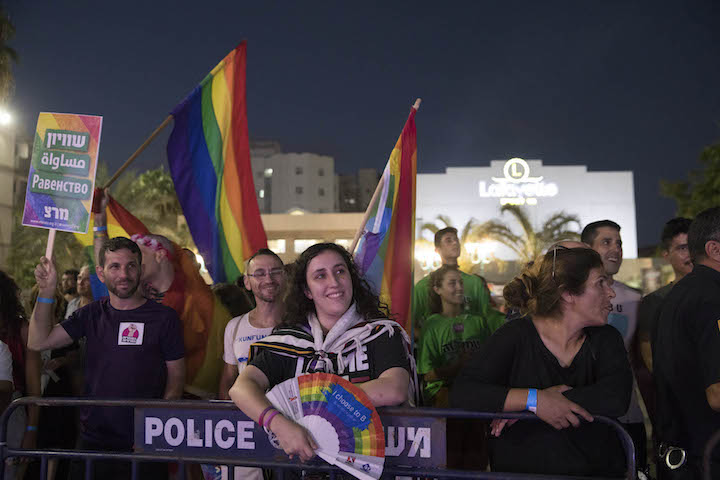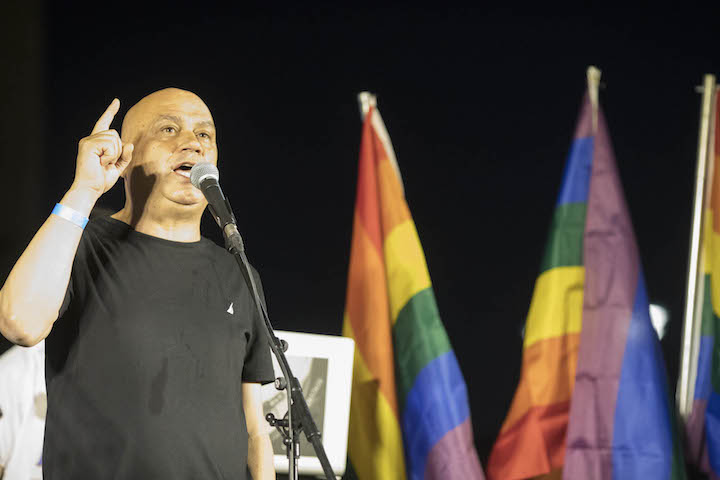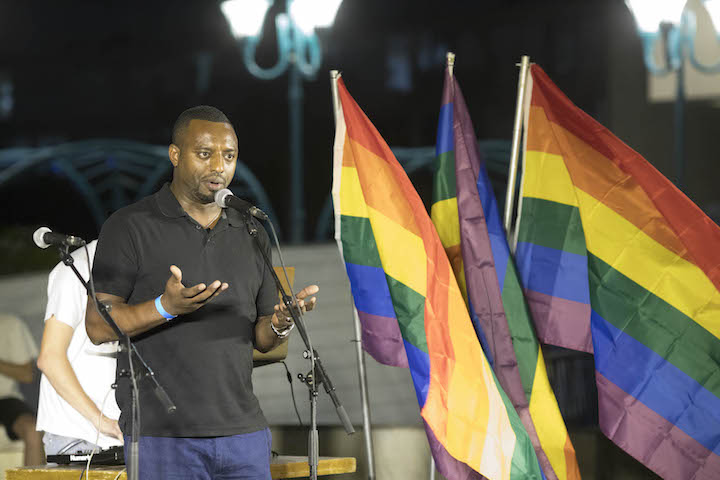Thursday’s event is the first pride event ever to include a speech by an Arab MK. ‘We cannot demand respect while disparaging the other. It is impossible to fight for my equality and not for that of others,’ MK Issawi Frej told the crowd.

Over 150 members of the LGBTQ community and their supporters took part in a joint Jewish-Arab pride event in the mixed city of Lod on Thursday. The event, the first of its kind in Israel, took place outside city hall, and follows a mass protest by LGBTQ Israelis earlier this week for equality and against discrimination.
“There are those who say the city is not ready for this, but how will it be ready if we don’t hold pride events?” asked Natalie Kirstein, a resident of Lod and an activist with the left-wing Meretz party, one of the main organizers of the event. “Last year there was controversy, this time we didn’t have any, and we received help from the municipality and the police.”
Although Kirstein and the other organizers had hoped for a turnout of 800 people, she still hailed the event as “historic.” Hen Arieli, the Executive Director of the Aguda, the Israeli LGBTQ community’s umbrella organization, and Adam Zulud, an Arab rapper and resident of the city, also spoke about what they viewed as a historic evening. “If you would have told me a few years ago that Lod would host a pride event, it would have seemed illogical to me. This is an amazing thing,” said Zulud moments before he stepped onstage to perform. “Lod will bring the gospel: a Jewish-Arab event that says we are all fighting for our lives here,” Arieli told the crowd.
It was also the first time an Arab member of Knesset spoke at a pride event. “I am proud of you and our friendship,” Meretz MK Issawi Frej told the crowd. “You have the same right as anyone else to live where you want and how you want. We believe that the human being is at the center, and this means a human being regardless of sex or color — we are equal. I am here to identify with you.”
Frej spoke about a new law to ease surrogacy regulations that left male gay couples without the ability to use a surrogate to have a child, as well as the Jewish Nation-State Law, both of which passed in the Knesset last week. “The Jewish Nation-State Law discriminates against the LGBTQ community, because when we talk about the extreme right wing in the Jewish state, we are talking about a state without LGBTQs. We are together in the same hole. We cannot discriminate against the LGBTQ community among us. We cannot demand respect while disparaging the other. It is impossible to fight for my equality and not for that of others. To be persecuted and become the persecutor,” Frej said.

Thursday night’s speakers emphasized the diversity of Lod’s LGBTQ community: Jews and Arabs, Russian speakers and Ethiopian-Israelis, religious and secular. All of them went onstage one after another, mixing in the square among the various youth groups and political parties, including both Meretz and Likud.
During the event, the organizers screened a number of short films showing volunteers reading letters in three languages written by members of Lod’s LGBTQ community who felt too unsafe to speak on stage. The letters described the fears and difficulties of being LGBTQ, especially when it came to more traditional families from different religions.
“Until recently, I was afraid that we would remain silent, that we wouldn’t fight, that we would find ourselves in the same situation as in Russia,” said Rita Patrenko, a Russian-speaking LGBTQ activist. “But a week ago I saw how we all went out into the streets, and now here in Lod, and I am no longer afraid. I am full of hope and pride. I am sure that we will continue until we get equal rights.”
Avihai Abarbanel, an activist with Hevruta, an organization for gay Jewish Orthodox men, told the crowd about his experiences being gay and religious: “I was asked about how we would respond to harmful statements by rabbis and the heads of the religious community, who incite and even call for murder. Unfortunately, none of us have an answer. I don’t know how a rabbi can express himself this way. I was raised on a respectful Judaism that teaches to love your neighbor as you love yourself. I was happy to learn that the majority of our public does not think like the rabbis.”

“The real threat that oppresses us is not here, not in the streets of Lod, but in the Knesset and Jerusalem,” Avi Yalou, an Ethiopian anti-racist activist, told the crowd, “that is where people are passing laws that lead to polarization and separation.” Yalou also called for the release of Avera Mengistu, an Ethiopian-Israeli who is being held hostage in Gaza.
“This is one of the most important events in terms of its location in Lod and the Jewish-Arab message it sends,” MK Tamar Zandberg told +972. “It was touching to see the people of this city gather in the square. One couldn’t ignore the unprecedented amount of security and fences around them — there is violence against the LGBTQ community everywhere, with murders in Jerusalem and Tel Aviv, and I hope that here, too, fears and caution will subside and the LGBTQ community will become part of the local community.”
This article was first published in Hebrew on Local Call. Read it here.

